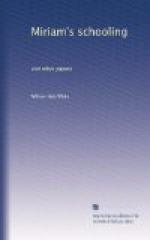I remember that dreadful day before the day of Gilboa. The host of the Philistines came and pitched in Shunem as the sand of the desert for number. Saul had gathered all Israel together, but they were fewer than the Philistines, and disheartened. He knew, moreover, that David and his men were with the enemy; and as he went out that morning, and saw the host of the Philistines lie upon the hillside, he greatly trembled, not with fear of death, for he never feared to die, but because his Terror was upon him, and the Lord refused to speak to him. He inquired of Him, but the Lord answered him not. The high priest had brought the ephod, but was dumb, and the prophets heard nothing. Two nights before the day of the battle, he had sought the Lord for a dream, and had lain down by my side in hope. The dream came, but it was a dream of the Terror, and he shrieked and turned, and clasped me in his arms; and I soothed him, and asked him what he had dreamed, but he could not tell—it was a horror, awful, shapeless, which he dared not try to utter; and he clasped me again, me wretched, clasped me for the last time. He rose and went out in the morning early; went round his army by himself. He was alone, and he knew that God had forsaken him.
In his extremity he bethought him of witchcraft. In his zeal for God, which availed him nothing, he had cast out of the land all those who dealt with familiar spirits, but one was still left at Endor. To her he went to obtain some voice from the unknown world, thinking that by chance light might shine in upon his despair. But when he came to the woman, and she asked him what spirit she should call, he could do nothing but ask for Samuel. He feared him, and yet he desired to see him. It was always strange to me that he, such a king, should be so subdued by Samuel’s presence. It was so in life, and it was so in death. The spirit of Samuel rose, and Saul humbled himself before the shadow. Alas, Samuel had learned no pity through death, and his ghost was as fierce as the living man of years gone. He had passed into the land of emptiness




